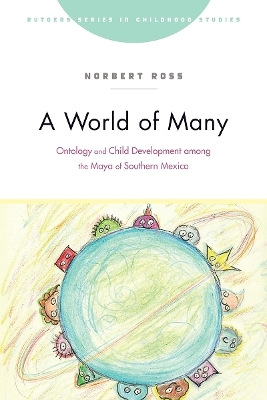
A World of Many
Rutgers University Press (Verlag)
978-1-9788-3031-8 (ISBN)
A World of Many explores the world-making efforts of Tzotzil Maya children from two different localities within the municipality of Chenalhó, Chiapas. The research demonstrates children’s agency in creating their worlds, while also investigating the role played by the surrounding social and physical environment. Different experiences with schooling, parenting, goals and values, but also with climate change, water scarcity, as well as racism and settler colonialism form part of the reason children create their emerging worlds. These worlds are not make believe or anything less than the ontological products of their parents. Instead, Norbert Ross argues that by creating different worlds, the children ultimately fashion themselves into different human beings - quite literally being different in the world. A World of Many combines experimental research from the cognitive sciences with critical theory, exploring children’s agency in devising their own ontologies. Rather than treating children as somewhat incomplete humans, it understands children as tinkerers and thinkers, makers of their worlds amidst complex relations. It regards being as a constant ontological production, where life and living constitutes activism. Using experimental paradigms, the book shows that children locate themselves differently in these emerging worlds they create, becoming different human beings in the process.
NORBERT ROSS is associate professor of Anthropology and Theater at Vanderbilt University. He is the author of Culture and Cognition: Implications for Theory and Method and the co-author (with Douglas L. Medin and Douglas G. Cox) of Culture and Resource Conflict: Why Meanings Matter.
1 Introduction
2 A World Where Other Worlds Can Be at Home
3 Ontology and Resistance
4 Folk-Biological Knowledge, Education, and
Framework Theories
5 Study Design and Methods
6 Complexity, Niche Theory, and Cultural Models
7 From Subsistence to Extraction: Globalization, Change,
and Spatial Organization in Chenalhó
8 Knowledge Sources and Learning Biases: Experience,
Values, and Ontologies
9 Growing Up in Chenalhó: Knowledge Sources and the
Spatial Distribution of Change and Modernity
10 What Is It Called? Plant Knowledge in Chenalhó
11 Concepts of “Alive and “Living Kinds”: Experience,
Culture, and Ontology
12 How Alive Is It? Revisiting the Concept of “Alive”
13 Being in Space
14 One of Many: The Making of a Diversity of Worlds
Acknowledgments
Notes
References
Index
| Erscheinungsdatum | 10.01.2023 |
|---|---|
| Zusatzinfo | 1 b-w illus., 1 table |
| Verlagsort | New Brunswick NJ |
| Sprache | englisch |
| Maße | 156 x 235 mm |
| Gewicht | 50 g |
| Themenwelt | Geisteswissenschaften ► Psychologie ► Allgemeine Psychologie |
| Geisteswissenschaften ► Psychologie ► Verhaltenstherapie | |
| Sozialwissenschaften ► Ethnologie | |
| Sozialwissenschaften ► Soziologie | |
| ISBN-10 | 1-9788-3031-9 / 1978830319 |
| ISBN-13 | 978-1-9788-3031-8 / 9781978830318 |
| Zustand | Neuware |
| Informationen gemäß Produktsicherheitsverordnung (GPSR) | |
| Haben Sie eine Frage zum Produkt? |
aus dem Bereich


